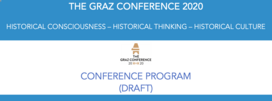Donnerstag, 12. November 2020
09:30 – 10:30 h Section III: Historical Culture in Intercultural Perspective I
Chair: Peter Gautschi
- Taming or Reconciling Contested Pasts. Reflections on historical culture in a globalizing world: Maria Grever (Erasmus Univ. Rotterdam)
- Teaching historical time in the Netherlands, Great Britain and Germany: Culture specific or transnational strategies?: Jochen Kirchhoff (Univ. of Erfurt)
- Elaborating historical thinking on monuments: Andreas Körber (Univ. Hamburg)
- Living history as a different way of showing historical culture. The Examples of Colonial Williamsburg, Plymouth Plantation and Jamestown Settlement: Ana Sánchez Rico (Univ. Camilo José Celo, Madrid)
Break
10:45 – 11:30 h Section III: Historical Culture in Intercultural Perspective II
Chair: Yvonne Sinclair
- What does the victory teach? The memory of the great patriotic war and the didactics of history in a modern Russian school: Andrei Linchenko (Lipetsk Univ.)
- Historiography and historical consciousness in settler-colonial societies like Australia: The 1938 Day of Mourning as ‘History Making’: Anna Clark (TU Sydney)
- Social representations of colonialism in Mozambique and Portugal: Alice Balbé / Rosa Cabecinha (Univ. of Minho)
11:30 – 12:30 h Panel Discussion: Historical Culture: New and open questions, challenges for the near future
Break
12:50 – 14:20 h Parallel Sessions I: Workshops and Poster Presentations
12:50 – 13:30 h Workshop I Intercultural Historical learning – Theory and Practice: Kenneth Nordgren / Maria Johanssen (Karlstadt Univ.)
| 12:50 – 14:30 h Poster Q&A Session I Chair: Bettina Paireder
|
13:50 – 14:30 h Workshop II International comparisons of historical thinking. First results and further ideas about qualitative approaches on empirical research on historical thinking in an international setting USA/Germany: Daniel Fastlabend (Univ. of Paderborn)
|
Break
15:00 – 16:30 h Section V: Interrelation to (theories) of global political, social, economic or cultural developments I
- 15:00 – 15:45 h The Planetary Age in Human History: Dipesh Chakrabarty (Univ. of Chicago)
- 15:45 – 16:30 h Panel / Comments by Dipesh Chakrabarty (Univ. of Chicago), Liz Dawes Duraisingh (Harvard GSE), Lindsay Gibson (UBC Vancouver), Andrea Komlosy (Univ. Vienna), Susanne Popp (Univ. Augsburg) and Thomas Sandkühler (HU Berlin)
Break
16:45 – 17:45 h Section V: Interrelation to (theories) of global political, social, economic or cultural developments II
Chair: Arthur Chapman
- Global History – World History – Big History. International Approaches in History Education: Susanne Popp (Univ. Augsburg)
- Interpretive frames for responding to racially stressful moments in history discussion: Abby Reisman / Lisette Enumah / Lightning Jay (Univ. of Pennsylvania)
- Corona crisis: Pacemaker for a new turnaround in human history: Andrea Komlosy (Univ. of Vienna)
- Learning in a democratic and cosmopolitain way? The impact of local and regional history: Anke John (Univ. of Jena)
17:45 – 18:30 h Panel Discussion: Interrelation to global developments: New and open questions, challenges for the near future
Kontakt
Alois Ecker
Institut für Geschichte
Heinrichstraße 26/VI
8010 Graz
Institut für Geschichte
Heinrichstraße 26/VI
8010 Graz
Benjamin Ecker
Institut für Geschichte
Heinrichstraße 26/II
8010 Graz
KONFERENZBÜRO
grazconference2020(at)uni-graz.at
+43 699 19221739
Bettina Paireder
Alois Ecker
Benjamin Ecker



